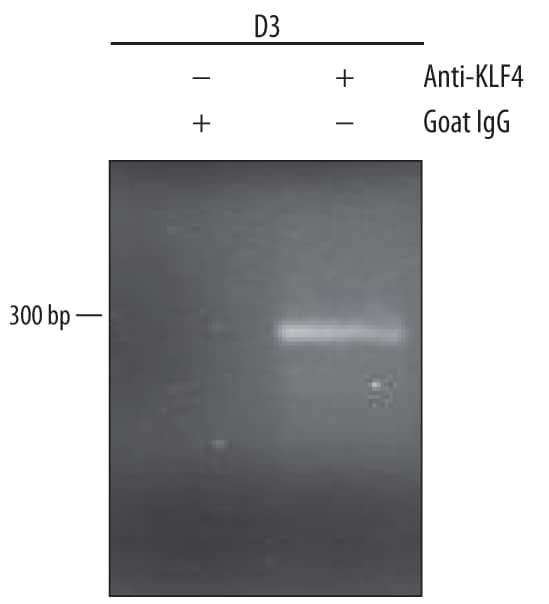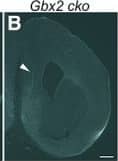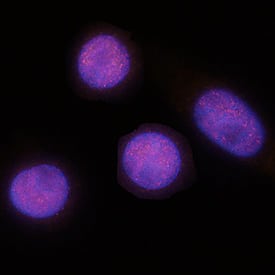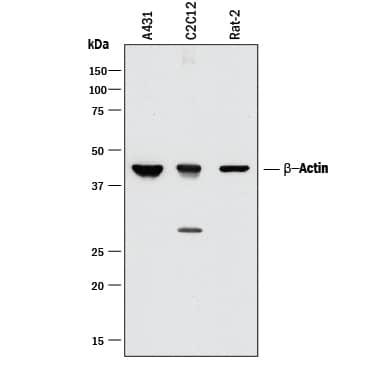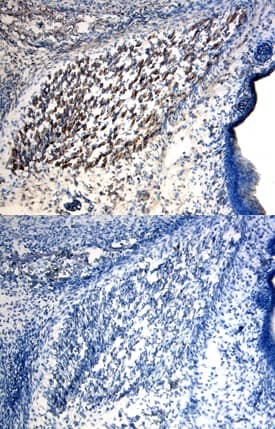Human/Mouse c-Myc Antibody Summary
Arg66-Asp201
Accession # P01106
Customers also Viewed
Applications
Please Note: Optimal dilutions should be determined by each laboratory for each application. General Protocols are available in the Technical Information section on our website.
Scientific Data
 View Larger
View Larger
Detection of Human c-Myc by Western Blot. Western blot shows lysates of LNCaP human prostate cancer cell line and HeLa human cervical epithelial carcinoma cell line. PVDF membrane was probed with 0.5 µg/mL of Goat Anti-Human/Mouse c-Myc Antigen Affinity-purified Polyclonal Antibody (Catalog # AF3696) followed by HRP-conjugated Anti-Goat IgG Secondary Antibody (Catalog # HAF017). A specific band was detected for c-Myc at approximately 56 kDa (as indicated). This experiment was conducted under reducing conditions and using Immunoblot Buffer Group 1.
 View Larger
View Larger
Detection of Mouse c‑Myc by Western Blot. Western blot shows lysates of BaF3 mouse pro-B cell line. PVDF membrane was probed with 0.5 µg/mL of Goat Anti-Human/Mouse c-Myc Antigen Affinity-purified Polyclonal Antibody (Catalog # AF3696) followed by HRP-conjugated Anti-Goat IgG Secondary Antibody (Catalog # HAF017). A specific band was detected for c-Myc at approximately 56 kDa (as indicated). This experiment was conducted under reducing conditions and using Immunoblot Buffer Group 1.
 View Larger
View Larger
Detection of c‑Myc-regulated Genes by Chromatin Immunoprecipitation. HeLa human cervical epithelial carcinoma cell line was fixed using formaldehyde, resuspended in lysis buffer, and sonicated to shear chromatin. c-Myc/DNA complexes were immunoprecipitated using 5 µg Goat Anti-Human/Mouse c-Myc Antigen Affinity-purified Polyclonal Antibody (Catalog # AF3696) or control antibody (Catalog # AB-108-C) for 15 minutes in an ultrasonic bath, followed by Biotinylated Anti-Goat IgG Secondary Antibody (Catalog # BAF109). Immunocomplexes were captured using 50 µL of MagCellect Streptavidin Ferrofluid (Catalog # MAG999) and DNA was purified using chelating resin solution. Thep21promoter was detected by standard PCR.
 View Larger
View Larger
c‑Myc in D3 Mouse Stem Cells. c-Myc was detected in immersion fixed D3 mouse embryonic stem cell line using Goat Anti-Human/Mouse c-Myc Antigen Affinity-purified Polyclonal Antibody (Catalog # AF3696) at 10 µg/mL for 3 hours at room temperature. Cells were stained using the NorthernLights™ 557-conjugated Anti-Goat IgG Secondary Antibody (red, upper panel; Catalog # NL001) and counterstained with DAPI (blue, lower panel). Specific staining was localized to nuclei and cytoplasm. View our protocol for Fluorescent ICC Staining of Cells on Coverslips.
 View Larger
View Larger
c‑Myc in BG01V Human Stem Cells. c-Myc was detected in immersion fixed BG01V human embryonic stem cells using 10 µg/mL Goat Anti-Human/Mouse c-Myc Antigen Affinity-purified Polyclonal Antibody (Catalog # AF3696) for 3 hours at room temperature. Cells were stained with the NorthernLights™ 557-conjugated Anti-Goat IgG Secondary Antibody (red; Catalog # NL001) and counterstained with DAPI (blue). View our protocol for Fluorescent ICC Staining of Cells on Coverslips.
 View Larger
View Larger
Detection of Human c‑Myc by Simple WesternTM. Simple Western lane view shows lysates of HeLa human cervical epithelial carcinoma cell line, loaded at 0.2 mg/mL. A specific band was detected for c-Myc at approximately 78 kDa (as indicated) using 20 µg/mL of Goat Anti-Human/Mouse c-Myc Antigen Affinity-purified Polyclonal Antibody (Catalog # AF3696) followed by 1:50 dilution of HRP-conjugated Anti-Goat IgG Secondary Antibody (Catalog # HAF109). This experiment was conducted under reducing conditions and using the 12-230 kDa separation system.
 View Larger
View Larger
Western Blot Shows Human c‑Myc Specificity by Using Knockout Cell Line. Western blot shows lysates of HEK293T human embryonic kidney parental cell line and c-Myc knockout HEK293T cell line (KO). PVDF membrane was probed with 0.5 µg/mL of Goat Anti-Human/Mouse c-Myc Antigen Affinity-purified Polyclonal Antibody (Catalog # AF3696) followed by HRP-conjugated Anti-Goat IgG Secondary Antibody (Catalog # HAF017). A specific band was detected for c-Myc at approximately 52 kDa (as indicated) in the parental HEK293T cell line, but is not detectable in knockout HEK293T cell line. GAPDH (Catalog # AF5718) is shown as a loading control. This experiment was conducted under reducing conditions and using Immunoblot Buffer Group 1.
 View Larger
View Larger
Detection of Mouse c-Myc by Western Blot DON significantly inhibits xenograft tumor growth.(A) SK-N-AS tumors were treated with DON at 100 mg/kg or water by i.p. twice weekly. Weight loss in DON-treated mice reduced the treatment cohort to 2 mice indicated by (2) at later timepoints. (B) SK-N-FI tumors were treated with DON at 100 mg/kg, 50 mg/kg or water by i.p. twice weekly or 100mg/kg once a week (100mg/kg; 1x/wk). The * indicates p< 0.05 between control and 50 mg/kg, while ** indicates p<0.05 between control and 100mg/kg; 1x/wk, Student’s t test. (C and D) For SK-N-BE2 and IMR32 subcutaneous xenografts, mice were treated with DON at 50 mg/kg or water control twice weekly by i.p. injections. The indicated tumor cell line was grown to 200 mm3 prior to initiation of treatment and tumor size is given as a percent relative to original tumor volume (% RTV). (E) Western blot analysis of N-Myc and c-Myc expression in a panel of NBL cell lines with beta -tubulin as a loading control. (F) A composite graph of SK-N-FI, SK-N-BE2 and IMR32 tumors treated with DON 50mg/kg or water control twice weekly. Image collected and cropped by CiteAb from the following publication (https://pubmed.ncbi.nlm.nih.gov/25615615), licensed under a CC-BY license. Not internally tested by R&D Systems.
Preparation and Storage
- 12 months from date of receipt, -20 to -70 °C as supplied.
- 1 month, 2 to 8 °C under sterile conditions after reconstitution.
- 6 months, -20 to -70 °C under sterile conditions after reconstitution.
Background: c-Myc
Human c-Myc is a 439 amino acid transcription factor with a bHLH/LZ (basic Helix-Loop-Helix, Leucine Zipper) domain. c-Myc DNA-binding and transcription function is achieved upon heterodimerization with its partner Max. c-Myc is often over-expressed and mutated in hematopoietic tumors. Mutations frequently result in truncations that remove the transactivation region or in the bHLH/LZ domain required for association with Max and DNA. Over the region used as immunogen, human c-Myc is 92% identical to the rat and mouse c-Myc proteins.
Product Datasheets
Citations for Human/Mouse c-Myc Antibody
R&D Systems personnel manually curate a database that contains references using R&D Systems products. The data collected includes not only links to publications in PubMed, but also provides information about sample types, species, and experimental conditions.
17
Citations: Showing 1 - 10
Filter your results:
Filter by:
-
SCARB2 drives hepatocellular carcinoma tumor initiating cells via enhanced MYC transcriptional activity
Authors: Wang F, Gao Y, Xue S et al.
Nat Commun
-
PVT1 dependence in cancer with MYC copy-number increase.
Authors: Tseng YY, Moriarity BS, Gong W et al.
Nature
-
The regulatory role of c-MYC on HDAC2 and PcG expression in human multipotent stem cells
Authors: Dilli Ram Bhandari, Kwang-Won Seo, Ji-Won Jung, Hyung-Sik Kim, Se-Ran Yang, Kyung-Sun Kang
Journal of Cellular and Molecular Medicine
-
Nuclear-cytoplasmic shuttling of class IIa histone deacetylases regulates somatic cell reprogramming
Authors: Zhiwei Luo, Xiaobing Qing, Christina Benda, Zhijian Huang, Meng Zhang, Yinghua Huang et al.
Cell Regeneration
-
High OGT activity is essential for MYC-driven proliferation of prostate cancer cells
Authors: Harri M Itkonen, Alfonso Urbanucci, Sara ES Martin, Aziz Khan, Anthony Mathelier, Bernd Thiede et al.
Theranostics
-
STAT1 regulates immune-mediated intestinal stem cell proliferation and epithelial regeneration
Authors: Takashima, S;Sharma, R;Chang, W;Calafiore, M;Fu, Y;Jansen, S;Ito, T;Egorova, A;Kuttiyara, J;Arnhold, V;Sharrock, J;Santosa, E;Chaudhary, O;Geiger, H;Iwasaki, H;Liu, C;Sun, J;Robine, N;Mautis, L;Lindemans, C;Hanash, A;
Nature communications
Species: Mouse
Sample Types: Whole Tissue
Applications: Immunohistochemistry -
SCARB2 drives hepatocellular carcinoma tumor initiating cells via enhanced MYC transcriptional activity
Authors: Wang F, Gao Y, Xue S et al.
Nat Commun
-
Chaetocin Promotes Osteogenic Differentiation via Modulating Wnt/Beta-Catenin Signaling in Mesenchymal Stem Cells
Authors: Y Liang, X Liu, R Zhou, D Song, YZ Jiang, W Xue
Stem Cells International, 2021-02-06;2021(0):8888416.
Species: Mouse
Sample Types: Cell Lysates
Applications: Western Blot -
LncRNA SNHG6 regulating Hedgehog signaling pathway and affecting the biological function of gallbladder carcinoma cells through targeting miR-26b-5p
Authors: XF Liu, K Wang, HC Du
Eur Rev Med Pharmacol Sci, 2020-07-01;24(14):7598-7611.
Species: Human
Sample Types: Cell Lysates
Applications: Western Blot -
Nuclear-cytoplasmic shuttling of class IIa histone deacetylases regulates somatic cell reprogramming
Authors: Zhiwei Luo, Xiaobing Qing, Christina Benda, Zhijian Huang, Meng Zhang, Yinghua Huang et al.
Cell Regeneration
Species: Mouse
Sample Types: Nuclear Extract
Applications: Western Blot -
Lysine-Specific Demethylase 1 (LSD1/KDM1A) Is a Novel Target Gene of c-Myc
Authors: M Nagasaka, K Tsuzuki, Y Ozeki, M Tokugawa, N Ohoka, Y Inoue, H Hayashi
Biol. Pharm. Bull., 2019-01-01;42(3):481-488.
Species: Human
Sample Types: Cell Lysates
Applications: Western Blot -
Convergence of cMyc and beta-catenin on Tcf7l1 enables endoderm specification.
Authors: Morrison G, Scognamiglio R, Trumpp A, Smith A
EMBO J, 2015-12-16;35(3):356-68.
Species: Mouse
Sample Types: Cell Lysates
Applications: ChIP -
Regulation of MicroRNA Machinery and Development by Interspecies S-Nitrosylation
Authors: Seth P, Hsieh PN, Jamal S et al.
Cell
-
S-adenosyl-l-homocysteine hydrolase links methionine metabolism to the circadian clock and chromatin remodeling
Authors: Greco CM, Cervantes M, Fustin JM et al.
Science advances
-
PITX2 enhances progression of lung adenocarcinoma by transcriptionally regulating WNT3A and activating Wnt/ beta -catenin signaling pathway
Authors: Jing Luo, Yu Yao, Saiguang Ji, Qi Sun, Yang Xu, Kaichao Liu et al.
Cancer Cell International
-
Cooperative Binding of Transcription Factors Orchestrates Reprogramming
Authors: Chronis C, Fiziev P, Papp B et al.
Cell
-
Suppression of BRD4 inhibits human hepatocellular carcinoma by repressing MYC and enhancing BIM expression
Authors: Gong-Quan Li, Wen-Zhi Guo, Yi Zhang, Jing-Jing Seng, Hua-Peng Zhang, Xiu-Xian Ma et al.
Oncotarget
FAQs
No product specific FAQs exist for this product, however you may
View all Antibody FAQsReviews for Human/Mouse c-Myc Antibody
Average Rating: 5 (Based on 1 Review)
Have you used Human/Mouse c-Myc Antibody?
Submit a review and receive an Amazon gift card.
$25/€18/£15/$25CAN/¥75 Yuan/¥2500 Yen for a review with an image
$10/€7/£6/$10 CAD/¥70 Yuan/¥1110 Yen for a review without an image
Filter by:




